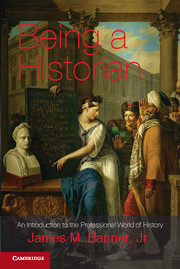Book contents
- Frontmatter
- Contents
- Preface
- Acknowledgments
- 1 The Discipline and Professions of History
- 2 The Structure of the Discipline of History
- 3 A Multitude of Opportunities
- 4 The Academic Trinity
- 5 History outside the Academy
- 6 Teaching and Writing History
- 7 Professional Principles, Responsibilities, Rights
- 8 Being Oneself as Historian
- Index
- References
7 - Professional Principles, Responsibilities, Rights
Published online by Cambridge University Press: 05 June 2012
- Frontmatter
- Contents
- Preface
- Acknowledgments
- 1 The Discipline and Professions of History
- 2 The Structure of the Discipline of History
- 3 A Multitude of Opportunities
- 4 The Academic Trinity
- 5 History outside the Academy
- 6 Teaching and Writing History
- 7 Professional Principles, Responsibilities, Rights
- 8 Being Oneself as Historian
- Index
- References
Summary
Historians are typically not diffident in expressing their views about the conduct, beliefs, and ethics of others, whether of their fellow historians or of those in other disciplines and professions. Yet they have a tendency to run for the exits when the phrase “professional ethics” is uttered or when they are asked to evaluate, against established standards of rights and responsibilities, the professional behavior of other historians. Because it is difficult to rid discussions of historians’ professional behavior of moralism, self-righteousness, and “oughts” and because few like to stand in open judgment of their peers, uneasiness infuses all attempts to come to terms with ethical issues. And because all historians believe that they adhere to professional principles (as most do), they often resist suggestions that the topic could bear some clarification – except when egregious cases of unethical behavior break into the news. They also tend to want emphasis in any discussion of ethics to fall principally upon the protection of historians’ rights.
Accordingly, save for moments of crisis (like the era of McCarthyism) or in response to major instances of, say, plagiarism, historians rarely debate the problematic nature of professional rights and duties. Moreover, there exists little sustained professional literature on the subject, an absence hard to justify any longer, given that more than thirty years have elapsed since professional associations of historians began to develop codes of practices for their members and created some at least elementary disciplinary mechanisms and enforcement procedures to accompany those codes. The canons of professional conduct can now be examined in their own right. They rarely are. The reflections that follow are meant more to focus attention and elicit discussion about some subjects that rarely receive formal attention than to propose any particular lines of action. I suspect that even raising them will arouse dissent and the argument that, in the absence of any immediate crisis, little worry about professional principles is warranted. Even if so, no reason exists not to subject these matters to debate during the preparation and careers of all historians.
- Type
- Chapter
- Information
- Being a HistorianAn Introduction to the Professional World of History, pp. 211 - 237Publisher: Cambridge University PressPrint publication year: 2012



